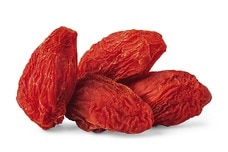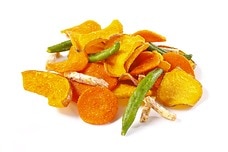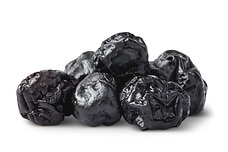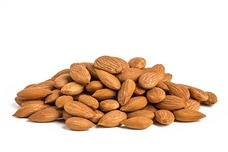Vitamin A
What is Vitamin A?
Vitamin A is an active compound of retinoids which occur naturally in both plant and animal tissues. There are two types of vitamin A found in our diet: preformed vitamin A and pro-vitamin A. Preformed vitamin A is found in animal products like meat, cod and halibut fish oil, and dairy products. This type of vitamin A is fat-soluble and typically in the form of retinoic acid, retinal, and retinol. Pro-vitamin A is found in plant-based foods like vegetables and fruit. Plant-based vitamin A is water-soluble and comes in the form of carotenoids, also known as beta-carotene, which must be converted by the human body into retinoids. Vitamin A is also available as dietary supplements typically in the form of retinyl acetate or retinyl palmitate (preformed vitamin A), beta-carotene (pro-vitamin A), or a combination of both. Although, it is typically advised that vitamin A be consumed through natural sources first.
Benefits of Vitamin A
Vitamin A has many nutritious benefits that are important for maintaining a healthy life. It plays a vital role in preserving healthy teeth, bone and soft tissue growth, and reproduction and immune system health. Vitamin A also helps form and maintain healthy skin and mucous membranes which allows them to repel bacteria and viruses more effectively. It also produces the pigments in the retina of the eye, which is why vitamin A is also called retinol. Furthermore, it promotes good vision especially in poor lighting. Vitamin A also has beta-carotene which is an antioxidant that protects cells from damage by free radicals.
Best Sources of Vitamin A
There are multiple sources of vitamin A that you can incorporate in your diet. In order to get the daily requirement of essential vitamins, it’s important to eat a balanced diet that includes a wide variety of fruits, vegetables, legumes, lentils, whole grains and protein sources like meat, fish and poultry.
Retinol Food Sources: Since retinol is a preformed vitamin A source, animal products are the best source of retinol. Meats such as poultry, fish, and the liver of any animal are great options for upping your vitamin A intake. Also dairy products like milk, butter, cream, yogurt, eggs and cheese are rich sources of retinol.
Beta-Carotene Food Sources: Beta-carotene is found in plant sources. Examples of fruits and vegetables rich in beta-carotene are tomato, pumpkin, broccoli, spirulina, grapefruit, blueberries, melon, kale, mango, carrots, and spinach.
How much Vitamin A do you need?
Depending on your age, the amount of vitamin A you need daily can differ. Here is the recommended dietary allowance (RDA) for vitamin A by The Food and Nutrition Board of the Institute of Medicine:
- Infants (average intake):
- 0 - 6 months: 400 micrograms per day (mcg/day)
- 7 - 12 months: 500 mcg/day
- Children:
- 1 - 3 years: 300 mcg/day
- 4 - 8 years: 400 mcg/day
- 9 - 13 years: 600 mcg/day
- Adolescents and Adults:
- Males age 14 and older: 900 mcg/day
- Females age 14 and older: 700 mcg/day
It is important to note that vitamin needs differ depending on age and gender. Other factors including pregnancy and personal health level can affect vitamin needs. To find out the best daily intake of vitamin A or any vitamins please consult your doctor.
Possible Harmful Effects of Vitamin A
Disease and Vision: Lack of vitamin A increases your risk of infectious diseases and vision problems. There is the potential to cause permanent blindness if lack of vitamin A is severe.
Vitamin A Toxicity: Consuming too much can cause vitamin A toxicity. Studies show that moderate doses of synthetic vitamin A (vitamin A supplements or multivitamins with vitamin A) can cause health problems and possible birth defects. Synthetic vitamin A lacks the “living” integrity of natural vitamin A which allows the body to utilize the vitamin correctly. Without being able to use the synthetic vitamin A properly, it collects in the body and can become toxic. However, natural vitamin A can also cause health problems when taken in extremely high doses. Chronic vitamin A poisoning may occur in adults who regularly take more than 25,000 IU (7,500 mcg) a day. To reduce the risk of vitamin A toxicity, reduce intake of multivitamins and fortified grain products. You can also pair vitamin A with vitamin D because vitamin A helps the body utilize vitamin A and prevents toxicity of the natural vitamin. Cod-liver oil is a great source of both vitamin A and D.
Skin Pigmentation: Increased amounts of beta-carotene can alter the pigment of skin causing it to turn yellow or orange. Be sure you are careful with your vitamin intake to get the most nutritional benefits without additional harm.
*This page is for informational purposes only and shouldn't replace medical advice.
Try some Vitamin A-Rich Foods!
Healthy Eating
- Healthy Snacks
- Healthy Highlights
- 5 Uses for Cacao Powder
- 5 Ways to Eat Farro
- 6 Best Gluten-Free Foods
- Alcohol and the Body
- Almond Flour Recipes
- Anti-Aging Superfoods
- Beat the Afternoon Slump
- Benefits of a Plant-Based Diet
- Benefits of Baobab
- Benefits of Cashews
- Benefits of Coconut Oil for Hair
- Benefits of Coconuts
- Benefits of Dates
- Benefits of Fenugreek
- Benefits of Garcinia Cambogia
- Benefits of Goji Berries
- Benefits of Kale Chips
- Benefits of Monk Fruit Sweetener
- Benefits of Peanuts
- Benefits of Pecans
- Benefits of Pistachios
- Benefits of Pumpkin Seeds
- Benefits of Spelt Flour
- Benefits of Steel Cut Oats
- Benefits of Sunflower Seeds
- Benefits of Tiger Nuts
- Benefits of Turmeric
- Benefits of Walnuts
- Benefits of Wheatgrass
- Best Food Fads
- Cacao vs Cocoa
- Caffeine-Free Energy Foods
- Chocolate That's Good for You
- Diet vs. Exercise
- Fat Burning Foods
- Food Myths Debunked
- Foods for Bone Density
- Foods for Colon Health
- Foods for Healthy Hair
- Foods for Healthy Skin
- Foods to Help Sleep
- Foods to Reduce Stress
- Green Tea Benefits
- Healthy Baking Flours
- Heart Healthy Habits
- High Protein Health Risks
- How to Boost Your Metabolism
- How to Lose Weight While Aging
- How to Throw a Vegan BBQ
- Kaniwa vs Quinoa
- Little Health Foods
- Low-Carb: Fad or Friend?
- Making Healthier Desserts
- Mediterranean Diet Meal Plan
- Natural Beauty Products
- Nuts for Weight Loss
- Preparing Vegan Meals
- Preventing Muscle Degeneration
- Rare Superfoods
- Reduce Sugar Intake
- Save Time By Going Vegan
- Smarter Snack Swaps
- Smoothie Ingredients
- Soy Protein vs Whey Protein
- Starting a Plant-Based Diet
- Steel Cut vs Rolled Oats
- Sugar Substitutes
- Vegan Proteins
- Vegan Substitutions for Fall Recipes
- Why Go Vegan
- Healthy Meals
- Healthy Recipes
- Sports Nutrition
- Nutrition and Special Diets
- 21 Day Fix
- 5 Popular Diet Similarities
- Alkaline Diet
- Anti-Inflammatory Diet
- Calorie Counting
- Carb Cycling Diet
- Celiac Disease
- Cholesterol
- Clean Eating
- Crohn's Disease
- DASH Diet
- Detox Diet
- Diabetes
- Diabetes Diet
- Diet Pill Dangers
- Fat Burning Foods
- Gluten-free Diet
- Glycemic Index
- Heart Health
- High Blood Pressure Diet
- High Fiber Foods
- How to Eat Healthy
- How to Lower Blood Pressure
- Hypertension
- IBS Diet
- Ketogenic Diet
- Liquid Diet
- Low GI Foods
- Low-Carb Diet and Foods
- Low-Fat High-Carb Diet
- Mediterranean Diet
- Mediterranean Diet Foods
- Military Diet
- Nutrition Labels Explained
- Paleo Diet
- Raw Food Diet
- Superfoods
- Sustainable Weight Loss
- Thrive Diet
- Vegan Diet
- Vegetarian Diet
- Weight Loss Shakes
- Whole30




